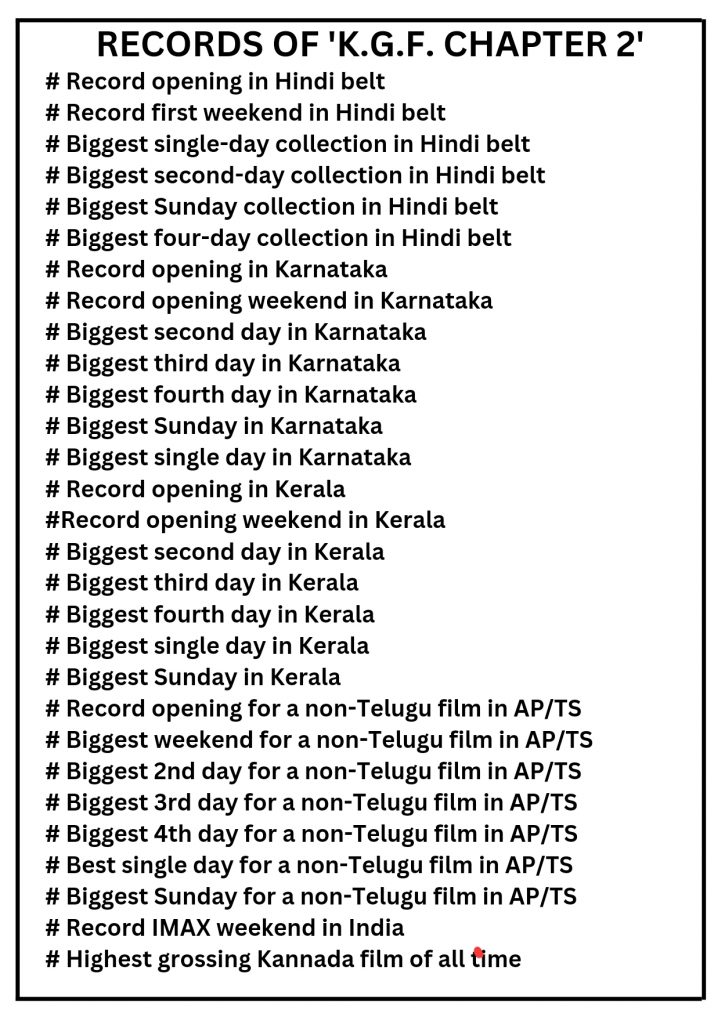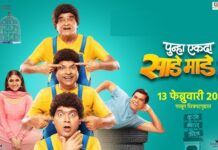At a time when films are not sustaining at the box-office, it is indeed nothing short of a miracle that a production house should deliver two blockbusters in a year. After the stupendous success of K.G.F. Chapter 2, Hombale Films followed it up with another super-duper hit, Kantara. The banner’s total revenue from the two films this year is more than Rs. 2,000 crore, an enviable feat, no doubt. Information met Vijay Kiragandur (on the left in picture above) and Chaluve Gowda, the two partners of Hombale Films, to understand the secret behind their phenomenal success in not just the Kannada film industry but across India.
How does it feel to have delivered two runaway hits at a time when the industry is passing through a lean phase?
– It feels great, no doubt. But we remain rooted and concentrate on working towards producing good content. Success and failure is difficult to predict in this fickle industry.
But how do you ensure that you produce hit after hit?
– We concentrate on our scripts. We select only good scripts, that too, after doing a lot of research and surveys. The research could relate to genres which people want to watch, kind of stories they want to see on screen, the kind of sequences which are liked by them. After that, we attach a lot of importance to our scripts and writers. After all, they are the pillars of a film. Only after a script is finalised do we search for a director who can execute the writer’s vision. We must add here that we have an in-house pool of people who get involved in the minutest details of the script. We keep on polishing the script till we are completely satisfied. After that, selecting the right director is equally important because what is the sense in having a great story if we don’t have the right person to execute the writer’s thoughts and get that story to the canvas. For a good film, it is very necessary that both, the writer and the director, should be good and talented.
How large is your in-house pool of writers?
– We have a team of around ten people who get involved at the scripting stage. We have script narration sessions every week. The suggestions in each session are weighed and worked upon week after week till the final script is ready. We neither fix the shooting dates before our script is cent per cent ready nor do we finalise our hero or other cast members till the script is final. We’ve never done that.
When you treat scripts as sacrosanct, do you allow stars to change the script?
– Never. Since we sign actors only after a script is locked, there’s no question of allowing anyone — star or anybody else — to alter the script. Suggestions about minor things are welcome but we don’t encourage alterations.
You spoke about research and analysis. What kind of research and analysis do you do?
– We have in-house data analysis people, and we also outsource analysis work to agencies. We had done an opinion poll before the release of K.G.F. CHAPTER 2 on whether we should release it in cinemas or go direct to OTT because of lockdown restrictions. Around 97% people said, they wanted to see the film in the cinemas. It is after this survey that we decided to get the film to the big screens only. We often do such surveys in tier 2 and 3 towns. We have budgets allocated specifically for such research and surveys.
Again, talking about K.G.F. CHAPTER 2. We took a lot of findings regarding the viewership of the film’s trailer, from YouTube. We finalised the number of cinemas in different areas based on this data. We also increased our promotion in areas where viewership of the trailer was low.
You both seem to be convinced that filmmaking may be an art but its business can be done scientifically, right?
– Yes, there is a definite science in this business. Till we start the shooting, we look into the minutest points of the script. Once shooting starts, we give the director a free hand. After that, we concentrate very heavily on marketing and release, which is done scientifically.
Do you also appoint script doctors who bring in objectivity?
– Yes, we do appoint freelancers who work as script doctors, when the need arises.
To what do you attach more importance — your judgement or to the findings of the research?
– More importance is given to the audience and, therefore, to the research findings. Agreed that as producers, we have to be satisfied. But the end users are members of the public.
Tell me something about your under-production film, Salaar.
– Our under-production SALAAR will be our biggest release so far. We’ve never made a film on as a grand scale as we are making SALAAR. Eighty-five per cent of the shooting is complete. We intend shooting the climax in January 2023. Its post-production will take around six months after that, hence we have scheduled its release in September ’23.
With Prabhas’ Radhe Shyam having flopped and because of the controversy surrounding his due-for-release Adipurush, are you scared that so much of yours is at stake in Salaar which stars him?
– No, not at all!
You seem to have conquered the all-India market with your Kannada films, K.G.F. Chapter 2 and Kantara. Aren’t you thinking of producing Hindi films?
– We are already working with some Hindi film writers. We will finalise the actors once we are ready with the scripts. You must’ve noticed that we are, perhaps, the only production house which announces the name of the director before the names of actors. We haven’t announced the names of the actors who will star in director Sudha Kongara’s film.
How did the two of you enter the film industry in 2013?
– We are passionate about films. According to us, like the food industry, the entertainment industry can never die. Hence it’s a very sustainable business.
Besides film production, what other business interests do you have?
– We are into construction and paramedical education too.
Of all your businesses, which one gives you the biggest high?
– In India, politics and entertainment give people the biggest high.
What are your thoughts on dubbed versions of South films doing better in the Hindi-speaking belt than Bollywood films themselves?
– This is just a passing phase. South remakes are often not working nowadays because the originals are available on YouTube. So if the audience has already seen the original on YouTube, oftentimes dubbed in Hindi, why will they repeat when such films are remade in Hindi? The public wants new stories. And it’s a fact that it is the South which has been writing fresh stories.
Are you not planning Kantara 2?
– We do have plans to produce KANTARA 2.
And what about K.G.F. Chapter 3?
– It depends on Prashanth Neel (director of K.G.F. CHAPTER 1 and K.G.F. CHAPTER 2).
Considering that you treat film production as a science too, would you say that film production is the most speculative business, more than the share bazaar?
– Even in the business of shares and stocks, there are some companies which have a long sustenance power and investing in which, you will not lose. The chances of going wrong in a business are minimum if you have set tools and procedures. And that includes the business of film production.
Do you, after your film’s release, also analyse the failure if a film does not work at the box-office?
– We always analyse our failures. A film is not treated as history and relegated to the sidelines if it flops. Proper post-mortem is done to understand what went wrong.
Tell me about your forthcoming projects.
– Besides SALAAR, which is being directed by Prashanth Neel, there’s DHOOMAM in Malayalam with Fahadh Faasil and National Award winner Aparna Balamurali, being directed by Pawan Kumar. National Award winning actress Keerthy Suresh stars in RAGHUTHATHA which is being directed by Suman Kumar who wrote the popular web series FAMILY MAN. There’s also BAGHEERA with Sreemurali. It is written by Prashanth Neel and directed by Dr. Suri. We will launch matinee idol Dr. Rajkumar’s grandson, Yuvarajkumar, in an as-yet untitled film being directed by Santhosh Ananddram. TYSON with Prithviraj Sukumaran, and RICHARD ANTHONY with Rakshith Shetty will be pan-India films. We also have National Award winning director Sudha Kongara signed for a film. And there’s an untitled film with Rishab Shetty, in the pipeline.






























